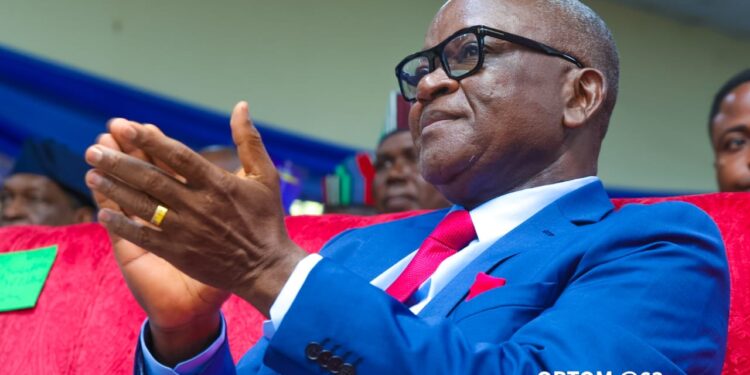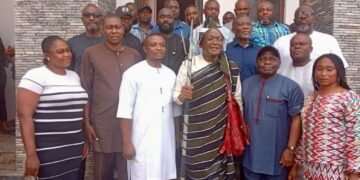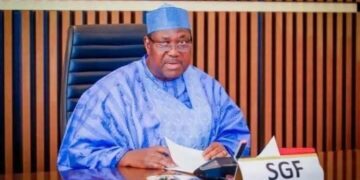On April 23, 2024, Professor Samuel O. Aghalino, FHSN, the President, Historical Society of Nigeria, Department of History and International Studies,
University of Ilorin, Ilorin, Nigeria, delivered a lecture during the 63rd Birthday Celebration of His Excellency, Samuel Ortom, former Governor, Benue State.
The lecture was titled ‘Democracy , Insecurity and the Future of Nigeria: Reading the Mind of H.E. Dr. Samuel Ortom’
Find below excerpts of the lecture:
“Samuel Ortom has over-positioned himself as one of the reliable pillars of democracy in the country. His mindset and vision of democracy is that politicians should put service to the people ahead of all other primordial interests associated with the office they occupy. To Ortom, power entails responsibility and privilege and responsibility should supersede privileges. In fact, at the risk of being misunderstood and criticized as working against the Federal Government of Nigeria, H.E. Samuel Ortom, on different occasions, expressed dissenting political views that exposed the underbelly of the Buhari administration.
“But as a true democrat, the goal of Samuel Ortom was not to merely sneer or shame the then APC government of Nigeria; his mind was to provide the needed political opposition that good governance in a democracy thrives on. His criticisms were geared towards serving as the wake-up call for the government to steer the Nigerian ship of state far away from the dangerous waters of the politics of business as usual and acrid bitterness, to the calm sea of pragmatic and sustainable governance.
“From 2015-2023, the Samuel Ortom administration in Benue State made stringent efforts to disentangle itself from Nigeria’s undemocratic leadership debacle. The mind of the then-governor was that democratic consolidation in the fourth Republic can only be achieved through transparent and accountable leadership. These are some of the core elements of good governance that Ortom intended to entrench in Benue state as the new democratic culture. In defense of this tradition, His Excellency Samuel Ortom when he left office as the governor of Benue state, responded positively to his successor’s (H.E. Governor Hyacinth Alia, Yes Father’s!) move to set up two panels to probe his administration. Ortom expressed a rare readiness to cooperate with the Commission’s investigation and urged all those he appointed while in office to make themselves available whenever they are called upon for questioning.
“In a political climate charged with the democratic undermining menace of corruption, Samuel Ortom’s warm embrace of the panel of inquiry attests to the depth and genuineness of his intentions when it comes to promoting democracy and good governance in Nigeria. Under this same situation, many of Ortom’s political contemporaries would have Japa to seek refuge abroad; but H.E. Samuel Ortom, as a true democrat and statesman, did the unthinkable in the Nigerian context. Ortom’s disposition is in line with what the then-governor of Ekiti State, Ayodele Fayose did when he surrendered himself to the Economic and Financial Crimes Commission(EFCC) when he finished his tour of duty as governor. Furthermore, in the spirit of statesmanship, and as part of his broad contribution to the consolidation of democracy in Benue State, Ortom advised his successor to focus on governing the people of Benue State and give them the dividends of democracy rather than wasting his time and taxpayers money searching for scapegoats. In other words, the former governor is advising his successor to emulate his political philosophy while in office. Thus, in the light of the disposition and the quest for the safety of his people, Bode Ojomu was apt when he described HE Samuel Ortom as a man of the people and the great defender of the Benue Valley. He went further to articulate his political philosophy which was embedded in existentialism.
“As an existentialist, Samuel Ortom believes that politicians do not have to strive to be perfect to provide good governance to the people because only God is perfect. In his mind, they only have to love the people. Therefore, when it comes to democratic consolidation, Ortom represents the school of thought that existence must take precedence over essence in governance. This means that leadership must focus on giving their followers what they truly need to live a satisfying life; and that humans have the freedom to create purpose and give meaning to life. When politicians succeed in doing this, then it can be rightly said that they have entrenched good governance. Existentialism as a political philosophy imbibed by Samuel Ortom also means that humans have the freedom to create their own identities and attributes that give meaning to their actions. In the context of democratic consolidation in Nigeria, existentialism explains why Ortom is passionate about standing for human values and defending the rights of man. At the same time, existentialism propels people who subscribe to it to be accountable and take responsibility for their actions when it is needed to preserve the common good of man. Therefore, it is a little wonder why Samuel Ortom courageously welcomed the probe panel set up against him by his successor in office. This is necessary for the sustenance of democracy in Benue state and elsewhere in Nigeria. Given this attribute of Ortom, Senator David Mark described the former governor of Benue state as an uncommon political leader in Nigeria committed to the well-being of the people.
“In point of fact, in the Nigerian political space, it is not an exaggeration to stress that, Samuel Ortom is one of the few politicians that stood in support and defence of their people. He is considered a good democratic role model because of his leadership style, courage, patriotism, humility, selflessness, decency, and moral uprightness. Thus, when he was serving as governor of Benue state, toward the end of his administration, he opted to negotiate something substantial for his people and the nation at large by the instrumentality of his political party, the Peoples Democratic Party, (PDP). In the run-up to the 2023 elections and with the disquiet and rumpus in his party, he joined other like minds in a concordat and formed the PDP G-5 grouping under the perceived leadership of the former governor of Rivers state, His Excellency Nyesom Wike. This group of 5 PDP governors in 2023 served not only as the top political elite class of the political party and its moral compass; they insisted that the in-house rules and unwritten agreements must be adhered to. This is even though the Chairman of his party was from Benue state. His Excellency Samuel Ortom preferred the bigger picture and the ultimate comfort of his people rather than being clannish.
“Consequently, towards consolidating democracy in Nigeria, H.E. Samuel Ortom in his capacity took the lead in the critique of the actions and policies of the then-incumbent Federal government. He criticized the Buhari government for ‘murdering justice’, fairness, and equity in Nigeria which opened the way for the rise of separatist agitations and insecurity. Ortom made these remarks based on his strong sense of responsibility to the people of Benue state as their governor and to Nigerians at large. Matter-of-factly, he spoke extempore that:
If I don’t speak, who will speak? I was elected popularly by the people of Benue State in 2015 and 2019. So if I can’t speak who will speak for Benue people? So if I stand committed even to the extent of those who are oppressed in other parts of the country that cannot speak on their behalf; I speak for those oppressed people in this country.
Read More: EFCC denies releasing list of erstwhile governors under investigation
“Samuel Ortom was a servant leader and was selfless by serving as the voice of the voiceless at great cost to himself. Defending his people and democracy came at a great cost for His Excellency. At a time, during the Buhari administration, the doors of Aso Rock, the seat of Power, were shut against him. He was allegedly declared an enemy and prevented from seeing the President because of his frequent criticisms, speaking truth to power, and holding the powerful accountable. It is a truism that democracy can only thrive in a nation theoretically and practically when the fundamental right of the people to be free from oppression, suppression, and marginalization is guaranteed. But for this to happen, the judiciary and the media need to be free also to serve as an outlet for people to ventilate and defend their constitutional rights. His Excellency Samuel Ortom, arguably fully believes in this, and since his emergence on Nigeria’s political landscape through words and action, he has been doing all he can to uphold all the virtues of democracy.
H.E. Dr. Samuel Ortom and Security in Nigeria
“History has shown that human beings have always exhibited the instinct to preserve their lives, homes, families, and possessions. And in the words of Nikita Kruschev, ‘every living thing wants to live’. Understandably, the Security of life and properties are fundamental enterprises for any serious government. Freedom from fear is without doubt pivotal to nation-building. In a multi-ethnic society, federating units must not have a sense of fear of the majority ethnic group wanting to dominate and exploit the minority ethnic group. Since Nigeria attained independence in 1960, this is the primary objective that the various governments that have administered the country sought to achieve. But so far, Nigeria’s political scorecard shows that peace and security have been elusive. Oladayo Nathaniel Awojobi explains that the interaction between poverty and insecurity that has worsened over time has been the fundamental reason for this. To this end, Hilary Matfess noted that Nigeria’s return to democracy in 1999 has been a tumultuous experience for the people in terms of insecurity. This is because the Fourth Republic has been marred by myriads of security challenges that have their roots in the country’s constitution, politics and governance, and management of the economy.
“However, Charles Nmadi Olise and Ikechukwu Eke Emeh hinged the source of Nigeria’s insecurity more on its constitution. They assert that the 1999 Constitution was not proactive in addressing the foreseeable security challenges of the country, and this has made the government of the nation only reactionary to criminalities and insecurity. The helplessness of the Nigerian state in the face of security challenges exists partly because the constitution has tied the hands of sub-national governments and partly because of the centralization of the Police and policing; and the resultant ineptitude of the federal government is responsible for creating a fertile environment for insecurity to fester. This is partly responsible for the pervasive material inequality and social imbalance triggering ethno-religious conflict and even the farmer-herder conflict. Other drivers of insecurity in Nigeria as identified by scholars include weak security system, loss of socio-cultural and communal value system, porous borders, terrorism, unemployment, and poverty. Indeed, the sources of insecurity in Nigeria are diverse and quite challenging and seem to have geo-political colouration. In the Southwest of Nigeria, insecurity takes the form of cybercrime, armed robbery, limited instances of kidnapping, domestic crime, extra-judicial killing, low-scale farmer-herder conflict, agitation for Yoruba nation and ritual killings. In the Southeast, insecurity consists of ritual killing, commercial crime, secessionist agitation, kidnapping, farmer-herder conflict, terrorism (unknown gunmen), and banditry; while in the Northeast insecurity involves humanitarian crises, Boko Haram and ISWAP terrorism, illegal mining, ethno-religious killing, and banditry. In the South-south, until recently when the amnesty programme was initiated, it was militancy, kidnapping, hostage-taking, robbery, illegal oil bunkering, illicit refineries, and piracy in the high sea.
“In Benue State located in the North-central of Nigeria, insecurity during the reign of Samuel Ortom as the governor of the state existed in the form of the farmer-herder conflict, banditry, and ethno-religious discord that threatened the foundation of democracy in the state. It was in this regard that the former governor deployed wit and bravery in the tackling of insecurity. From 2015-2023, the mind of Samuel Ortom as the Chief Security Officer of Benue State was quite clear as his actions testified to this. To him, insecurity must be tackled to protect the fledgling democracy of Nigeria and protect the life and properties of the Benue people. Across the country during the period, insecurity made life nasty, brutish, and short, because security governance deteriorated to the point where the Nigerian state lost its monopoly over the use of firearms and deadly weapons. Poor arms control allowed destructive and disgruntled elements in Nigeria to gain access to, and proliferation of small and light weapons and unleash terror on villages and communities with impunity. They attacked, looted, vandalized police stations, and even freed prisoners held in correctional facilities in some parts of Nigeria 30. Little wonder Ortom, as governor of Benue State, decided to launch an all-out frontal attack on insecurity.
“Since the farmer-herder conflict was the primary source of insecurity in Benue state during his tenure, Ortom faced it squarely. He adopted several tough measures to arrest the development and redeem all ungoverned spaces in the state. To this end, His Excellency even had to go glove-to-glove with the Federal government of Nigeria led by President Muhammadu Buhari. In a time when the Buhari government was vehemently pushing for open cattle grazing, the RUGA system, and the establishment of cattle routes across the federation among others; the Ortom administration in Benue state stood against these anti-people policies to keep his people safe and protect their land. In 2017, the Ortom administration signed into law the Anti-Open Grazing and Ranching Prohibition Law. This law was geared towards keeping herders and their cattle off the farmland of the Benue people. To deter herders from encroaching into the farmlands of Benue people, the anti-open grazing law imposed stiff penalties on defaulters. What to note is that the anti-grazing law was replicated in most states in southern Nigeria. The difference however is that while Ortom implemented the law in Benue state with religious zeal, in other states, it was merely to fulfill all righteousness.
“More importantly, towards securing the lives and properties of the Benue people, H.E.Samuel Ortom became the first governor to reject the Federal government Rural Grazing Area (RUGA) Settlement Scheme. He ensured that no part of Benue territory was grabbed by the Buhari administration for the establishment of cattle colonies and grazing reserves among others in Benue State. To him, ranching is a private enterprise and the government must not be seen to be overtly supporting one business against another. Ortom saw the RUGA scheme as a deceptive land-grabbing tactic in favour of a particular ethnic group and as this was an injurious and detrimental policy that may ultimately hurt the interest of Benue farmers. In another dimension, Samuel Ortom established the Benue state security outfit called Community Volunteer Guard in 2022 to keep Benue people and Benue land safe. The community and state security unit was charged with the responsibility of repelling herdsmen attacks. This measure could be rightly described as Ortom’s community-based solution to the problem of insecurity in Benue state. Beyond politics, the establishment of the Community Volunteer Guard, to say the least, was a visionary push for the much-celebrated clamour for state police. But because it would appear the issue of security was highly politicized during Buhari’s administration, the Community Volunteer Guard just like its southwest equivalent of Amotekun, was given the cold shoulder by the federal government. Ortom brought the impunity of Fulani cattle herders to the limelight and drove the process of taming their atrocities with Napoleonic zeal.
There is no doubt that Ortom will be remembered for his rugged determination to protect his people and the accolade, the Lion of the Benue Valley, is befitting. Ladies and gentlemen, let us now examine Ortom’s view and perception of one Nigeria.
H.E. Samuel Ortom and One Nigeria
‘One Nigeria’, is a catchword that speaks to the idea of the indivisibility of Nigeria. This is the core element of the post-colonial nation-building process by successive leaders in the country. The celebrant, H.E. Samuel Ortom, as we have seen in the preceding pages, is, without doubt, one of the Nigerian political elites who believe strongly in one Nigeria. In his words and deeds, the former governor of Benue state has made it very clear that his commitment to the unity of Nigeria which is based on equity is non-negotiable. His mindset on the question of democracy, insecurity, and one Nigeria is readable by examining his political conduct in office and the security steps he took to keep the people safe. Democracy is all about the people and a leader who can find a nexus between respect for human rights and the security of life and property, is serving the interest of one Nigeria. Therefore, it can be rightly said that Ortom belongs to this class of Nigerian elites. He represents the school of thought that holds that leadership must be geared towards service to the people. In the mind of Ortom, leaders must be responsible and accountable to the people they are elected to serve. When leadership is visionary, transparent, and accountable to the people, it would enjoy popular support which would earn it the much-needed legitimacy.
“It can be safely argued that good governance and credible leadership are critical means of actualising the dream of one Nigeria. Good leadership is a magnetic force that can easily pull people together and move them to look beyond their ethnic and religious differences. This is reflected in the popular support Samuel Ortom enjoyed as the governor of Benue State from 2015-2023. His role as the unifier of the people of the Benue Valley explains why he was able to win elections under three different political parties. Beyond Benue state, Ortom has also promoted unity nationwide by serving as the voice of oppressed and suppressed Nigerians against bad leadership. He believed that once the social contract was sealed on the day of the election, the new government from the day it took off had a binding responsibility to promote the rule of law, constitutionalism, and free and fair elections. Implicit in this understanding is the fact that H.E. Ortom is of the view that democratic consolidation is imperative for the realization of one Nigeria. Closely following this mindset is his view that peace and security are essential for there to be one in Nigeria. Insecurity generally breeds restlessness and uncertainty that easily make people edgy and resentful. When this is the case, people can quickly turn against one another in a never-ending battle of attrition. The long-term and multiplier effect of conflict on Nigeria is that it usually gives rise to crises of confidence in the Nigerian state and pitches the people against their leaders. When this situation becomes the norm in the nation the people can be said to be saying to one another “To your tent O Israel”. Under this circumstance, people can start adopting different self-help strategies and become their own Chief Security Officers. In a sense, life will become harsh, and unbearable, and the Hobbesian state of nature may be reenacted.
One Nigeria in the mind of Ortom can therefore be best achieved when all Nigerians can feel safe and secure in their native homeland and in other parts of the country where they reside. They must also be free to go about their daily business at home and elsewhere in Nigeria without fear of occupational hazards such as herdsmen encroachment into farmlands, without let or hindrance.
“The point must be made that today, one Nigeria has become more than an ideal; it connotes all and whatever the people of the country, particularly the leadership class, need or need to do to bring Nigerians together to live in peace and unity. Politically, it is a call for good governance and security of lives and properties in the mind of Samuel Ortom. Economically, it is a call to respect the occupation and work environment of other Nigerians. Socially, one Nigeria can be reconstructed from the mind of Ortom to mean a call for equity, and ethnic and religious tolerance that is needed to engender social harmony and reconciliation.
“H.E. Dr. Samuel Ortom, the former governor of Benue state, is a Nigerian political actor who, by his words and deeds , is a true defender of the people. As a politician, Ortom contributed in no small measure to the actualisation of one Nigeria through good governance and visionary leadership that powers democracy. In putting the people first as a true democrat, Ortom prioritized the security of life and properties of Benue people and Nigerians in general by serving as the voice of the voiceless. His landmark measures at securing the interest of Benue farmers are exemplary. These measures cemented his place in Nigerian history as a man of the people. Reading the mind of this powerful politician and believer in justice and fair play, we found that responsible, transparent, and accountable leadership are the surest ways to achieve the one Nigeria vision of the founding fathers of the country. The ability to carefully synthesize and imbibe good leadership devoid of entrenched interest is a sine qua non for making democracy workable and for sustaining lasting peace and security in the country. Ladies and gentlemen, as a historian, I make bold to say that generous pages are reserved for H.E. Samuel Ortom in the chronicles and the history of Benue state, the Benue valley, and resistance politics in Nigeria in general.”







